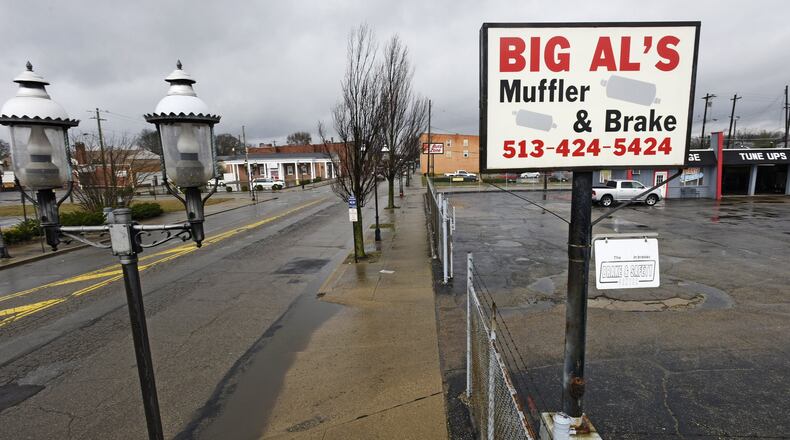Since that meeting, the developer, city officials and DMI worked on a compromise so that the project could move forward. Part of the compromise was moving the placement of the 9,700 square-foot building on the parcel and using brick instead of CMU block for the exterior finish, which reduced the number of zoning variances to five being sought at the BZA hearing.
According to the city staff report, the variances requested included:
- Locating the front entrance and primary building frontage on side elevation facing Charles Street
- Permit less than 60 percent ground floor transparency on the prima1y building frontage
- No parking lot screening
- Allowing more than zero feet setback facing Charles Street
- Allowing the building to have less than 70 percent of site width on Grimes Street, Central Avenue and Charles Street
After the public hearing, city staff recommended approval for the five variances.
Dustin Hurley, a local attorney representing the developer said during the hearing that the original application to the Historic Commission is totally different than the one that was before the BZA. He said the original request was denied but the developer “opted to play ball because they really wanted to come to Middletown.”
Hurley described the various meetings with city staff and downtown business owners as well as a number of conference calls with the Arizona-based developer.
He said out of that support from the city and others, they felt the changes “met the spirit of the UCC zone.”
Hurley also pointed out that the parcel that was bordered by three streets made it difficult locate the front entrance for the store and said the code was vague and unclear on that point. Businesses in the UCC are supposed to have storefronts on the street with parking at the rear of the building. However, that would have required the proposed O’Reily storefront to be 194 feet long on Central Avenue.
“You have to take in the whole picture,” Hurley said.
Phillip Harrison, DMI president, added the organization’s support in addition to the letter of support that was submitted earlier.
“This is a compromise agreement,” Harrison said. “You’re not going to get everything you want. I think it will beneficial to the community.”
MORE: Proposed development met with resistance in Middletown
Mike Robinette, owner of Liberty Spirits, acknowledged the work that was done by the city, developer and DMI to get to this point, but insisted that O’Reily has followed local zoning laws elsewhere where communities insisted.
To support his opposition, Robinette presented several photos and a packet of information that he wanted on the record should the matter end up in Butler County Common Pleas Court.
“O’Reily will build a store in an attractive manner where the community expects it,” he said.
Robinette also questioned if the developer actually had standing to apply for the variances as they were not the property owner and there was no proof that they were the agents of the property owner. He also said the store’s front entrance should be on Central Avenue, not facing Charles Street.
“The applicant is not under any hardship for these variances,” Robinette said. “These were personal choices of O’Reily, not a justification for variances.”
MORE: Plan outlines ways Middletown can upgrade downtown
BZA Chairman Todd Moore said he appreciated the information that Robinette submitted, but that the developer’s request fell into “a practical hardship… These are reasonable requests and that the hardship was met.”
BZA Member Fred Gibson said he was impressed with DMI’s letter of support and the cooperation among DMI, the developer and city officials and agreed that a hardship existed for the developer to build.
Before the meeting, BZA member Christopher Amburgey commented, “you can choke on principle and die. At some point we have to honor the UCC.”
As the vote was about to being taken, Amburgey said he would be voting no.
“I’m pro-business nine times out of 10, but I’ll choke on principle and vote no,” he said.
M ORE: What type of businesses have opened in downtown Middletown?
The BZA approved the variances 6-1. The developer will need to return to the Historic Commission for its approval before being able to proceed with building the store. Opponents have the option to appeal the BZA decision to the Butler County Common Pleas Court.
Robinette could not be reached for comment about possible next steps.
About the Author

